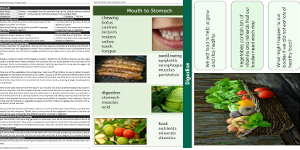Digestion

This science scheme of work for Key Stage Two gets the children to describe the functions of different parts of the digestive system and the importance of eating foods as part of a healthy lifestyle. The class can sequence the stages in the digestive process and explain how different foods are used by the body.

Identify and describe the functions of some of the different parts of the digestive system and the importance of eating foods as part of a healthy lifestyle

Lesson One : Chewing and Swallowing
Practise composing and presenting a diary entry to describe the movement of a vegetable from the mouth to the stomach as part of the digestive system

Lesson Two : Stomach
Investigate. describe and record how the stomach can be used to extract a range of nutrients from different types of food

Lesson Three : Intestines
Explore and illustrate how a range of nutrients are extracted from types of food during the different stages of digestion in the human body

Lesson Four : Digesting Food
Identify, describe and record some of the benefits that different types of foods can have on the body during the process of digestion

Lesson Five : Fibre
Explore, describe and record the importance of fibre in the diet that is used to aid the process digestion of food in the human body

Lesson Six : Digestion Rap
Compose and perform a rap to illustrate and explain each of the different steps in the digestive process that is used to extract nutrients from food

Digestion Assessment
Assess abilities in identifying and describing the functions of some of the different parts of the digestive system and the importance of eating foods as part of a healthy lifestyle
-

Maths Arithmetic Assessment
Assess abilities in solving arithmetic number problems for addition, subtraction, multiplication and division when working with informal and formal written calculations
-

Environment
Identify and describe some of the special landscapes and locations that can be found in the world and reflect on how they can be protected and preserved for the future
-

Silent Letter Words
Explore and illustrate the meanings and spellings of some different words with silent letters when using them in a range of topics and scenarios
-

Complaint Letters
Explain and model how to format and structure writing when composing letters of complaint about different issues and scenarios
